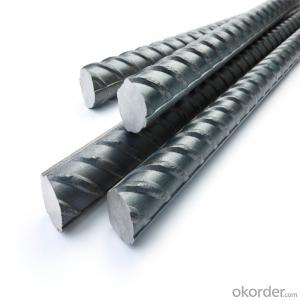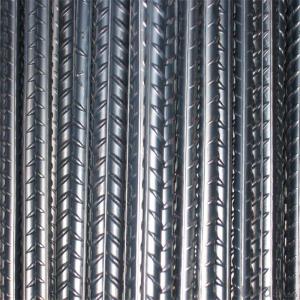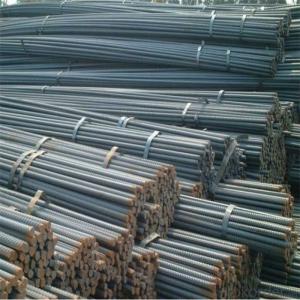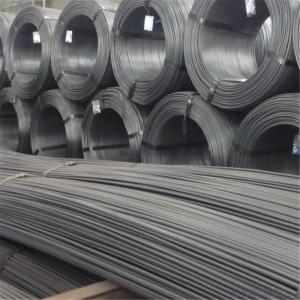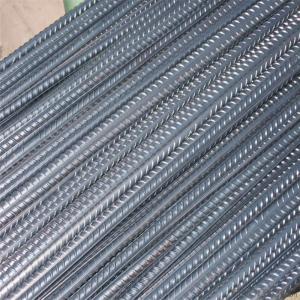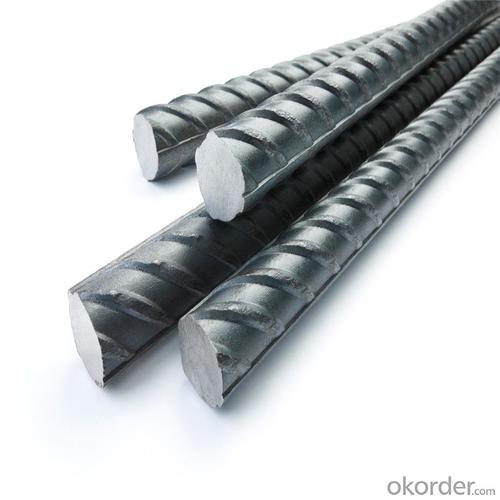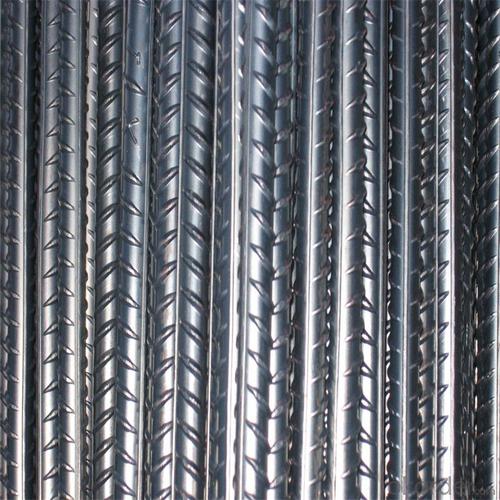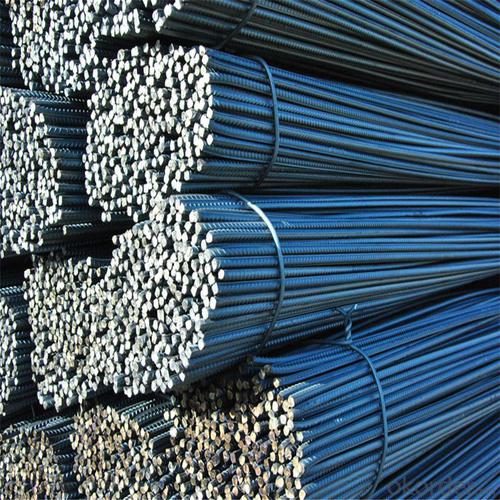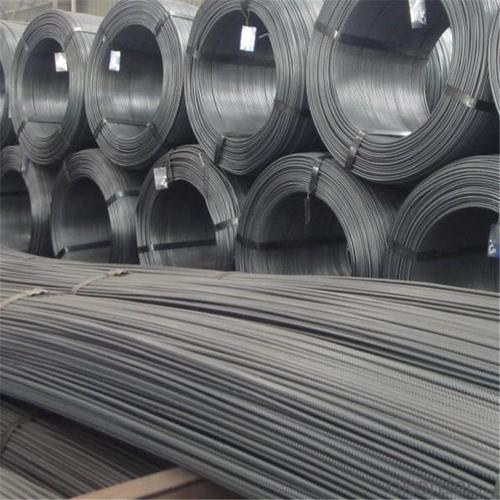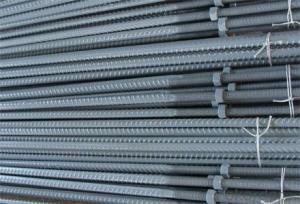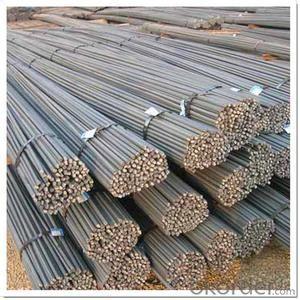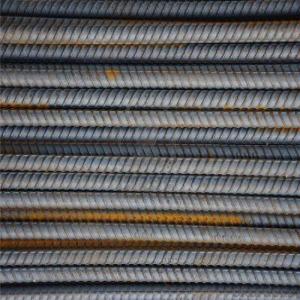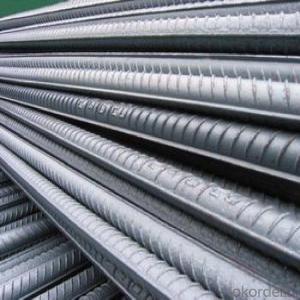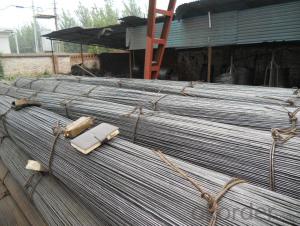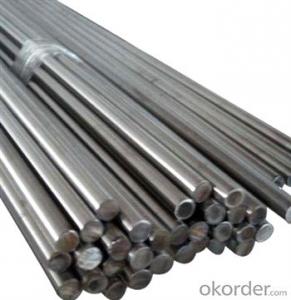Gr40 Ribbed High Quality Steel Rebar
- Loading Port:
- Tianjin
- Payment Terms:
- TT OR LC
- Min Order Qty:
- 170 m.t.
- Supply Capability:
- 500000 m.t./month
OKorder Service Pledge
OKorder Financial Service
You Might Also Like
Specification
Gr40 Ribbed High Quality Steel Rebar
Description of Gr40 Ribbed High Quality Steel Rebar
1, Diameter: 5.5mm-10mm Gr40 Ribbed High Quality Steel Rebar
10m- 40mm Gr40 Ribbed High Quality Steel Rebar
2, Length: 6m, 9m, 12m or customized
3, Standard: GB, ASTM, AISI, SAE, DIN, JIS, EN
OEM technology - send detailed technical parameters for accurate quotation.
2, Produce Process: smelt iron - EAF smelt billet - ESR smelt billet -
hot rolled or forged to get the steel round bar and plate
3, Heat Treatment: annealing, normalizing, tempering, quenching
4, Surface Treatment: Black
5, Quality Assurance: We accept third party inspection for all orders.
You can ask testing organizations such as SGS, BV, etc. to test our products before shipping.
Chemical Composition of Gr40 Ribbed High Quality Steel Rebar
Grade | Technical data of the original chemical composition(%) | |||||
Reinforcing steel bar HRB335 | C | Mn | Si | S | P | B |
≤0.25 | ≤1.60 | ≤0.80 | ≤0.045 | ≤0.045 | >0.0008 | |
Physics Capability | ||||||
Yield Strength(N/cm2) | Tensile Strength(N/cm2) | Elongation(%) | ||||
≥ 335 | ≥490 | ≥16 | ||||
Reinforcing steel bar HRB400 | C | Mn | Si | S | P | B |
≤0.25 | ≤0.16 | ≤0.80 | ≤0.045 | ≤0.045 | 0.04-0.12 | |
Physics Capability | ||||||
Yield Strength(N/cm2) | Tensile Strength(N/cm2) | Elongation(%) | ||||
≥ 400 | ≥ 570 | ≥ 14 | ||||
Products Show of Gr40 Ribbed High Quality Steel Rebar
Company Information
CNBM International Corporation is the most important trading platform of CNBM group.
Whith its advantages, CNBM International are mainly concentrate on Cement, Glass, Iron and Steel, Ceramics industries and devotes herself for supplying high qulity series of refractories as well as technical consultancies and logistics solutions.


F A Q
1, Your advantages?
professional products inquiry, products knowledge train (for agents), smooth goods delivery, excellent customer solution proposale
2, Test & Certificate?
SGS test is available, customer inspection before shipping is welcome, third party inspection is no problem
3, Factory or Trading Company?
CNBM is a trading company but we have so many protocol factories and CNBM works as a trading department of these factories. Also CNBM is the holding company of many factories.
4, Payment Terms?
30% TT as deposit and 70% before delivery.
Irrevocable L/C at sight.
5, Trading Terms?
EXW, FOB, CIF, FFR, CNF
6, After-sale Service?
CNBM provides the services and support you need for every step of our cooperation. We're the business partner you can trust.
For any problem, please kindly contact us at any your convenient time.
We'll reply you in our first priority within 24 hours.
- Q: Can special steel be used in the battery manufacturing industry?
- Yes, special steel can be used in the battery manufacturing industry. Special steel is often used in battery production for various purposes, such as in the construction of battery casings, terminals, and other components. Its high strength, durability, and resistance to corrosion make it suitable for ensuring the safety and longevity of batteries.
- Q: What are the specific requirements for special steel used in the agricultural sector?
- Special steel used in the agricultural sector has specific requirements to ensure optimal performance and durability in the demanding conditions it will be subjected to. Some of the key requirements for special steel in the agricultural sector include: 1. Corrosion resistance: Agricultural equipment often comes into contact with corrosive substances such as fertilizers, pesticides, and animal waste. Special steel used in this sector must have high resistance to corrosion to prevent premature deterioration and ensure long service life. 2. High strength: Agricultural equipment is subjected to heavy loads, impacts, and vibrations during operation. Special steel used in this sector must possess high tensile strength and toughness to withstand these forces without deformation or failure. 3. Wear resistance: Agricultural machinery operates in abrasive environments, where soil, rocks, and other debris can cause significant wear on metal surfaces. Special steel used in the agricultural sector should have excellent wear resistance to maintain sharp cutting edges and prevent premature wear. 4. Machinability: Agricultural equipment often requires complex components with intricate shapes and profiles. Special steel used in this sector should have good machinability to enable easy fabrication, welding, and shaping of the steel into the desired form. 5. Heat resistance: Some agricultural processes involve high temperatures, such as heat treatment or exposure to hot gases. Special steel used in these applications should have good heat resistance to maintain its mechanical properties and structural integrity even at elevated temperatures. 6. Cost-effectiveness: Agricultural equipment manufacturers often need to balance performance with cost. Special steel used in the agricultural sector should provide a cost-effective solution, offering the desired properties at a competitive price. By meeting these specific requirements, special steel used in the agricultural sector can provide reliable and efficient performance, contributing to the productivity and longevity of agricultural machinery and equipment.
- Q: Can special steel be used for nuclear power plant components?
- Yes, special steel can be used for nuclear power plant components. Special steel alloys such as stainless steel, low-alloy steels, and nickel-based alloys are commonly used in nuclear power plants due to their excellent mechanical properties, resistance to corrosion, and ability to withstand high temperatures and radiation. These materials are specifically designed to meet the stringent safety and performance requirements of nuclear power plant components, ensuring the integrity and reliability of the plant.
- Q: What are the different corrosion protection methods used for special steel?
- There are several corrosion protection methods used for special steel, including coating with anti-corrosive paints or sealants, galvanizing with zinc or other metals, applying sacrificial anodes, using corrosion inhibitors, and employing cathodic protection techniques such as impressed current or sacrificial anode systems.
- Q: What are the requirements for special steel used in corrosive environments?
- To ensure durability and performance in corrosive environments, special steels must possess specific properties. The requirements for these steels can be summarized as follows: 1. Excellent corrosion resistance is the primary requirement. The steels should be able to withstand aggressive substances like acids, alkalis, and salts without showing signs of corrosion. This ensures the longevity of the steel and maintains its performance. 2. High strength is crucial for handling mechanical stresses imposed on the steel in corrosive environments. It is particularly important for applications with heavy loads, pressures, or impacts, as it helps maintain the steel's integrity and structural stability. 3. Resistance to pitting and crevice corrosion is essential. These localized forms of corrosion can occur in the presence of certain aggressive chemicals or stagnant environments. Steels should be resistant to such forms of corrosion to prevent localized damage and potential failure. 4. Resistance to stress corrosion cracking is necessary. This phenomenon occurs when a corrosive environment compromises the material's integrity under tensile stress. Special steels should be resistant to stress corrosion cracking to ensure reliability under applied loads. 5. Good resistance to intergranular corrosion is important. This type of corrosion along grain boundaries weakens the material. Special steels used in corrosive environments should have resistance to intergranular corrosion to maintain structural integrity. 6. Thermal stability is essential for high-temperature corrosive environments. Special steels should exhibit thermal stability to resist degradation and maintain their properties in elevated temperatures. 7. Ease of maintenance is a desirable characteristic. Special steels used in corrosive environments should be relatively easy to clean, resistant to fouling or scaling, and compatible with commonly used cleaning agents or procedures in the industry. It is important to note that the specific requirements for special steels in corrosive environments may vary depending on the application and type of corrosive substances encountered. Therefore, careful consideration of specific needs and consultation with experts in the field is crucial for selecting the most appropriate steel for each corrosive environment.
- Q: Can special steel be used in the production of medical implants?
- Medical implants can indeed utilize special steel materials. Examples of these special steels include stainless steel, titanium alloy, and cobalt-chromium alloy. These steels possess unique properties that make them suitable for medical purposes. Notably, they are biocompatible, meaning they do not cause any adverse reactions or toxicity within the human body. Additionally, they exhibit high strength, corrosion resistance, and the ability to withstand the harsh conditions found inside the human body. Consequently, special steels can be employed in the production of various medical implants, such as orthopedic implants like hip and knee replacements, dental implants, cardiac stents, and surgical instruments. By incorporating special steel into medical implants, durability, longevity, and biocompatibility are ensured, thus providing patients with a dependable choice to enhance their quality of life.
- Q: What is the fatigue strength of special steel?
- The fatigue strength of special steel refers to its ability to withstand repeated loading and unloading cycles without failure or deformation. It is typically higher than that of regular steel due to its unique composition and manufacturing process, which enhances its resistance to fatigue and improves its durability in demanding applications.
- Q: What is the impact of impurities on the properties of special steel?
- The presence of impurities in special steel can have a significant impact on its properties. Impurities can weaken the steel's structural integrity, reduce its mechanical strength, and compromise its corrosion resistance. High levels of impurities can also affect the steel's ability to be fabricated or shaped into desired forms. Therefore, it is crucial to minimize impurities during the manufacturing process to ensure that special steel maintains its desired properties and performance characteristics.
- Q: Is special steel suitable for structural applications?
- Yes, special steel is well-suited for structural applications. This type of steel is engineered to possess specific properties and characteristics that meet the demands of various applications. Industries such as construction, automotive, aerospace, and oil and gas often rely on special steel. The outstanding strength, durability, and resistance to corrosion of special steel make it an ideal material for structural applications. It can withstand heavy loads, high temperatures, and extreme weather conditions, ensuring the safety and longevity of structures. Furthermore, special steel offers excellent weldability, machinability, and formability, allowing for flexibility in design and construction. It can be easily shaped, fabricated, and assembled into various structural components, making it suitable for complex and unique projects. Moreover, special steel comes in a wide range of grades and types, each tailored to meet specific structural requirements. These include carbon steel, alloy steel, stainless steel, and tool steel, among others. This versatility enables engineers and designers to select the most suitable type of special steel for their specific application, ensuring optimal performance and cost-effectiveness. In conclusion, special steel is highly suitable for structural applications due to its exceptional strength, durability, resistance to corrosion, and design flexibility. The wide range of grades and types available allows engineers and designers to choose the most appropriate material for their specific project requirements.
- Q: Can special steel be used in the agricultural industry?
- Yes, special steel can be used in the agricultural industry. It is often utilized in the manufacturing of various farm equipment and machinery, such as plows, harrows, cultivators, and tractor components. Special steel's high strength, durability, and resistance to corrosion make it suitable for withstanding the demanding conditions and prolonged use in agricultural operations.
Send your message to us
Gr40 Ribbed High Quality Steel Rebar
- Loading Port:
- Tianjin
- Payment Terms:
- TT OR LC
- Min Order Qty:
- 170 m.t.
- Supply Capability:
- 500000 m.t./month
OKorder Service Pledge
OKorder Financial Service
Similar products
Hot products
Hot Searches
Related keywords
